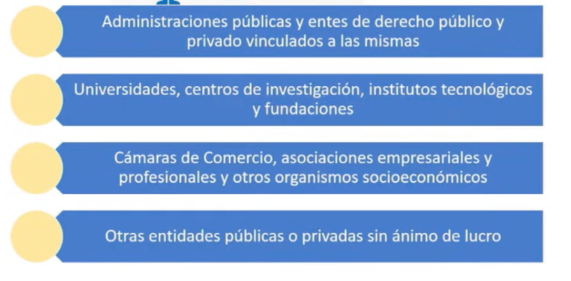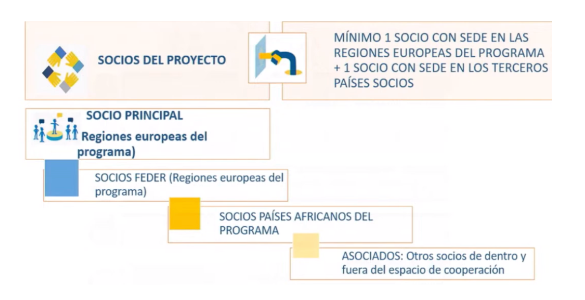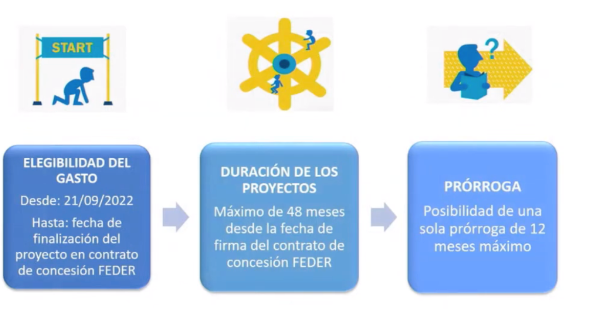INTERREG MAC
The Mac Interreg programme is part of the European Union's cohesion policy and is designed to promote the exchange of experience, knowledge and good practice between participating regions.
Mac interreg is a European programme offering non-repayable grants covering all costs necessary to implement a programme carried out in consortium by several partners located in the following countries (staff, travel, subcontracting, advertising, overheads, etc.).
WHERE? beneficiary COUNTRIES
- European Regions: Madeira, Azores, Canary Islands
- Neighbouring African countries: Ghana, Côte d'Ivoire, Gambia, Senegal, Mauritania, Sao Tome and Principe and Cape Verde.
WHO? PROFILE. BENEFICIARY PARTNERS:
Public bodies and private non-profit organisations located in European regions (at least one) + beneficiary countries (at least one). The grant is received by each partner to cover its expenses. Each partner must prepare its own expenditure budget based on its needs. However, by In the case of ERDF funds, it is the European partner who will manage the funds. Once expenses for an activity are to be declared, a supporting report must be submitted to the controller who will assess the estimated income.

REQUIREMENTS?
Submit a project in consortium with a minimum of "x" partners, led by a European partner.

WHEN?
- Start of the call for proposals with its terms and conditions will be published in July
- Full consortium application deadline!!!: End of September 2023.
- Allocation in January or February 2024.
- Project implementation period: 4 years (until the end of 2027)

Projects are selected through open calls for proposals, in which those that best meet the objectives and criteria of the programme are evaluated and selected. Projects are expected to be approved in less than 9 months.
WHAT DOES MENTORDAY OFFER?
The Canarian NGO mentorDay is looking for partners to form the consortium that will implement a project in each of the countries that already have extensive experience in helping startups, business development, fostering innovation, internationalisation, or attracting investment.
We would like to develop a joint cooperation project with selected local partners in each region and in each country. The aim of the project is to promote the exchange of experiences, knowledge and good practices between the partners in order to promote the economic, social and environmental development of the beneficiary regions.
PROJECT
We want to improve the competitiveness of companies in each consortium partner's region through innovative and smart economic transformation (Smart Mac, point 1.3).
Developed according to this smart INTERREG OMC BASIS, module 1.3
The productive fabric of the cooperation area has a series of characteristics that have significantly conditioned the evolution of its competitiveness and internationalisation.
The adoption of measures to boost entrepreneurship in strategic sectors and activities and contribute to overcoming the difficulties of SMEs.
The business fabric shows a clear predominance of micro-enterprises, with entrepreneurship below the EU average (if we take the creation of new companies as a reference point) and a volume of merchandise exports that is also low. On the other hand, the productive fabric is characterised by its lack of diversification and high specialisation in the tourism sector and a series of traditional economic activities, intensive in natural resources, which are based on the production of primary products, and not so much on the links in the value chain that require a higher degree of transformation, in which a higher added value is obtained.
These weaknesses, together with the potential of its location as a nexus between Africa, America and Europe, make it necessary to adopt measures to promote entrepreneurship (prioritising those located in what are considered strategic sectors or activities), and to contribute to overcoming the difficulties faced by SMEs, thereby favouring the participation of regional companies in the markets through the use of joint capacities and the opportunities of territorial cooperation.
The consolidation of an innovative culture in the companies of the cooperation area, in short, contributes to the reduction of the existing gap in terms of competitiveness with the leading companies in new technologies, as well as the identification of market niches at world level that favour the diversification of economic activity and the creation of jobs.
Projects under this objective are expected to contribute to the Atlantic 2.0 Action Plan for a sustainable, resilient and competitive blue economy. Specifically, projects under this objective will be able to contribute to Pillar I of this Plan (Ports as gateways and hubs for the blue economy) and Pillar II (Blue skills of the future and knowledge about the oceans).
THE TYPOLOGY OF ACTIONS SHALL INCLUDE, INTER ALIA, THE FOLLOWING:
- Awareness-raising, advice, mentoring and support actions for the productive fabric in innovation processes.
- Actions that develop innovative applications that use advanced digital technologies such as Big Data and artificial intelligence in measurement, management and decision-making. Initiatives that increase the capacity of SMEs and micro-enterprises, including those in traditional sectors, to innovate and take up key cross-cutting and enabling technologies.
- Activities for the generation and transfer of know-how in the management of technology-based companies, pilot experiences, creation of spin-off companies, etc. 38
- Actions aimed at intensifying the participation of small enterprises in innovation projects, through tools and models adapted to their needs and capacities.
- Support services for innovation and internationalisation.
- Creation of public-private platforms to support SMEs.
- Creation of joint marketing platforms to optimise processes and reduce costs.
The Territorial Cooperation Programme INTERREG VI-D MADEIRA-AZORES-CANARIAS (MAC) is a regional cooperation programme financed by the European Union that aims to promote the economic, social and environmental development of the regions covered by this programme. It seeks to encourage cross-border cooperation between these regions, with the aim of improving competitiveness, innovation and sustainability in the geographical area covered.








